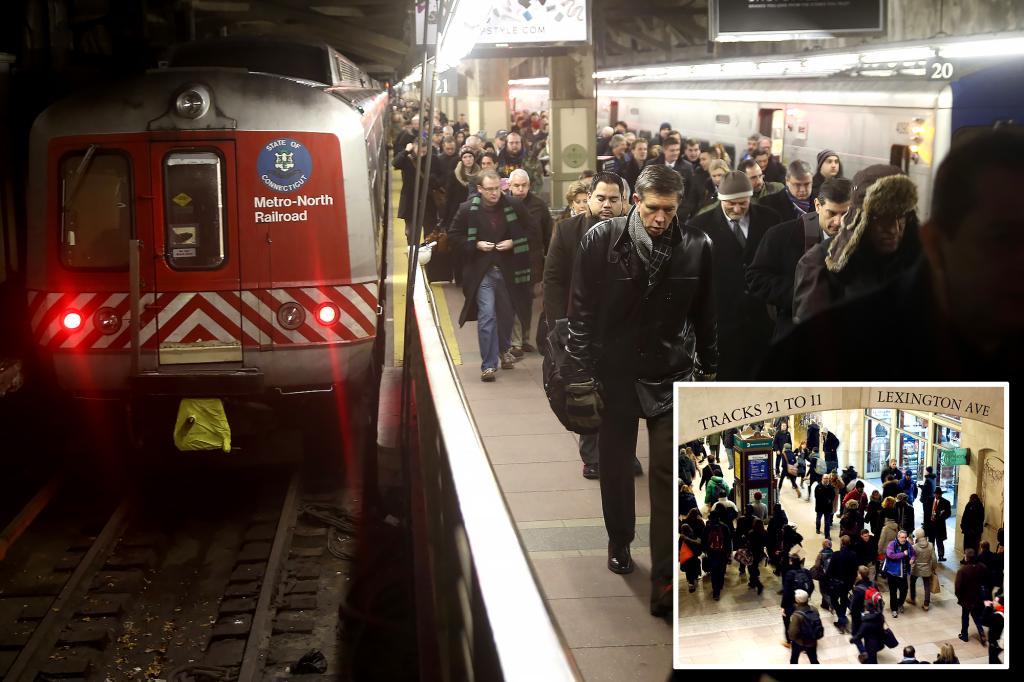The tranquility of a Saturday evening commute was shattered on a Metro-North train arriving at Grand Central Terminal as a dispute over loud music escalated into a violent stabbing. The incident, which unfolded around 7 p.m. on a New Haven line train, involved a 46-year-old man, Abdul Malik Little, who was playing music from his phone’s speaker. When a fellow passenger, a 31-year-old man, requested that he lower the volume, Little allegedly reacted with extreme aggression. As the train pulled into the bustling station, Little reportedly stabbed the complainant twice in the chest with a knife. Despite his injuries, the victim managed to exit the train and identify his attacker to Metropolitan Transportation Authority (MTA) police officers patrolling the platform. The officers swiftly apprehended Little and recovered the weapon. The injured commuter was transported to Bellevue Hospital, where his wounds were thankfully determined to be non-life-threatening. Little, a resident of Jamaica, NY, was subsequently charged with Attempted Murder, Felony Assault, and Criminal Possession of a Weapon.
This incident marks the second stabbing in as many weeks at Grand Central Terminal, raising concerns about safety and security within the transit system. It follows a series of disturbing and violent crimes that have recently plagued the city’s subways and commuter rail lines, creating an atmosphere of unease among commuters. Just a week prior, on Christmas Eve, a suspect identified as Jason Sargeant allegedly engaged in a rampage through Grand Central, slashing a man’s wrist and a woman’s neck. These attacks, coupled with several other high-profile incidents, have brought the issue of subway safety into sharp focus, prompting renewed calls for increased security measures and a greater police presence in the transit system.
Adding to the sense of alarm was a horrific incident on December 22nd, in which a woman riding the F train was tragically set on fire and burned to death. The alleged perpetrator, Sebastian Zapeta-Calil, a 33-year-old undocumented immigrant from Guatemala, reportedly ignited the victim’s clothing, fanned the flames, and then stood by as 57-year-old Debrina Kawam succumbed to her injuries at the Coney Island-Stillwell Avenue station. Zapeta-Calil has been indicted on charges of first and second-degree murder and arson, with his next court appearance scheduled for January 7th. This brutal and senseless act of violence shocked the city and further underscored the vulnerability of passengers within the subway system.
The string of violent incidents continued into the new year, with a shocking attack on New Year’s Eve. A straphanger waiting for a train at the 18th Street station in Chelsea was suddenly and unexpectedly pushed onto the tracks in front of an approaching 1 train. The entire incident was captured on surveillance video, providing chilling evidence of the unprovoked assault. The series of attacks, ranging from stabbings and slashings to arson and pushing incidents, has created a climate of fear and anxiety among subway riders, prompting calls for increased police presence and enhanced security measures.
The escalating violence within the transit system has prompted a resurgence of the Guardian Angels, a volunteer citizen patrol group known for their distinctive red berets. Curtis Sliwa, the organization’s founder and a former mayoral candidate, announced earlier this week that the Guardian Angels would be resuming patrols of the city’s subway system for the first time since 2020. Sliwa, speaking at the Stillwell Avenue-Coney Island station in Brooklyn, stated that the group would be increasing their numbers, intensifying their training, and expanding their presence in the subway, harkening back to their initial patrols in 1979. The return of the Guardian Angels reflects the growing concern over safety in the subway and the desire for visible signs of increased security.
The recent spate of violent crimes in the subway system, including the stabbing at Grand Central, the Christmas Eve slashings, the horrific burning death of a woman on the F train, and the New Year’s Eve pushing incident, have collectively heightened public anxiety and fueled a renewed debate about safety and security in the city’s transit system. The resurgence of the Guardian Angels and their decision to resume subway patrols underscore the public’s perception of increased danger and the desire for a more visible security presence. These incidents collectively highlight the challenges faced by city officials and law enforcement in ensuring the safety of commuters and restoring public confidence in the transit system. The ongoing dialogue surrounding these incidents focuses on the need for effective strategies to address the root causes of violence, enhance security measures, and create a safer environment for all who rely on public transportation.

